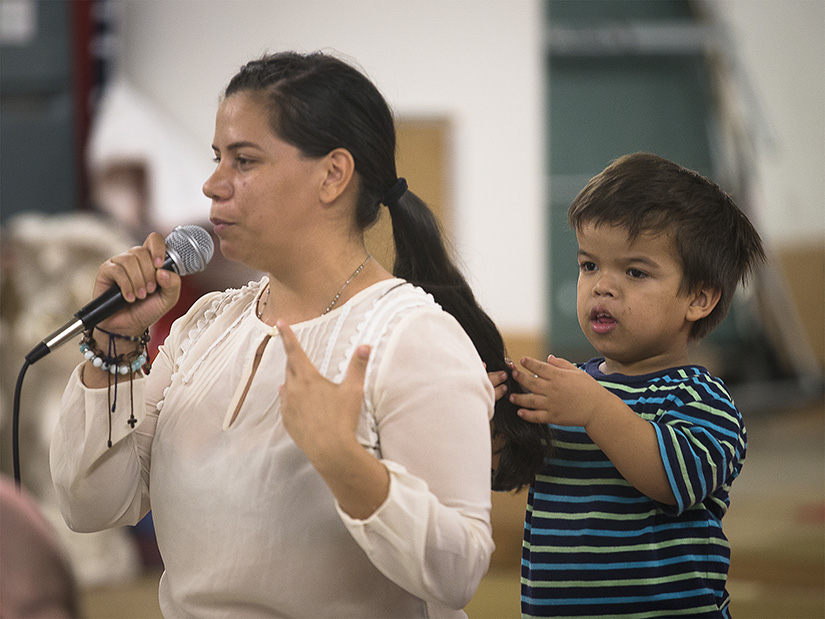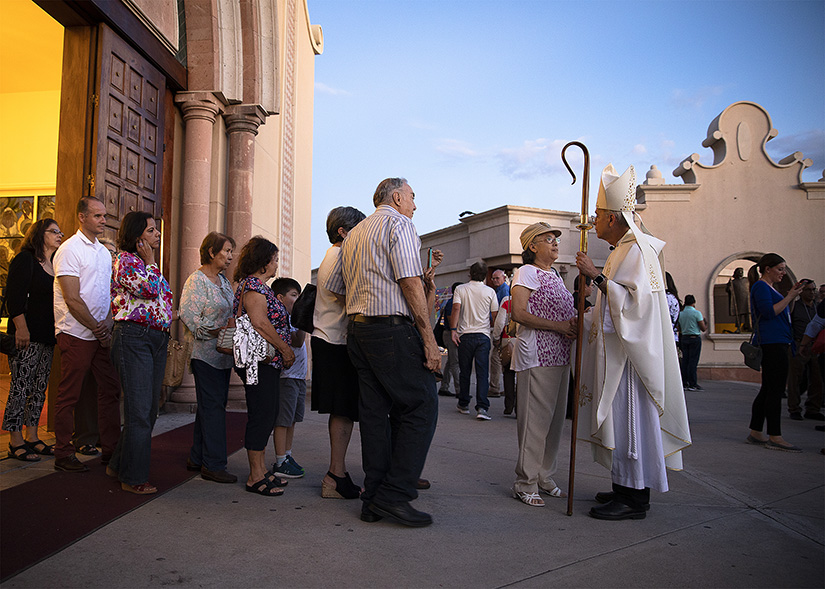CIUDAD JUAREZ, Mexico — Up until July, 30-year-old Ingrid had a successful career as a pharmacist in her native Nicaragua. She owned a home, where she raised her two boys, ages 12 and 8, and expected to always remain in the country she so loved.
However, political strife led her to join in nonviolent marches criticizing the government, seeking, as many Nicaraguans have done, to have a say in the country where she thought her children would grow up.
But in August, that dream came crashing down as threats against her, for participating in anti-government demonstrations, began to worry her more and more until one day she decided it was time to grab the boys and leave — for good.
“I came only with the clothes I had on,” the mother of two told Catholic News Service Sept. 24, after speaking with a delegation of bishops, staff members from the U.S. Conference of Catholic Bishops, lay ministers and others visiting the border region Sept. 23-27. “I left my entire life in Nicaragua.”
 Ingrid, seen with her son, shared her immigration story about coming north from Nicaragua at Corpus Christi Church in Ciudad Juarez, Mexico, Sept. 24.She thought she’d find some understanding and safety heading with her children toward the U.S., she explained, but she quickly found out she was wrong as she and her children felt the weight of the “Remain in Mexico” policy that tells asylum-seekers to wait in the neighboring country for their immigration court dates.
Ingrid, seen with her son, shared her immigration story about coming north from Nicaragua at Corpus Christi Church in Ciudad Juarez, Mexico, Sept. 24.She thought she’d find some understanding and safety heading with her children toward the U.S., she explained, but she quickly found out she was wrong as she and her children felt the weight of the “Remain in Mexico” policy that tells asylum-seekers to wait in the neighboring country for their immigration court dates.
“It’s sad to arrive, to knock on the door and to have that door close without being heard,” she explained to the group visiting a Catholic church in Ciudad Juarez, which offered her help. The group included Bishop Mark J. Seitz of the neighboring Diocese of El Paso, Texas, Bishop Oscar Cantu of San Jose, Calif., Bishop Brendan J. Cahill of Victoria, Texas, as well as Father Robert Stark, regional coordinator of the Vatican’s Section on Migrant and Refugees.
She was one of many migrants the group met during the second day of a week of encounters with farmworkers, their families, asylum-seekers, refugees and other migrants in the border region near El Paso and neighboring Ciudad Juarez.
They spoke with Ingrid, whose last name is being withheld for her protection, met her children, and shared a meal with them and others as they heard the migrants’ plight.
But it wasn’t the only story of unwelcome they heard that day.
The group also visited Casa del Migrante, or House of the Migrant, a shelter in Ciudad Juarez, where bishops spoke with and blessed a group of immigrants returning to their home countries after the U.S. denied them entry or they had no hope of being allowed to enter.
Nelson Lopez, admittedly a bit dejected, waited in line at the shelter with others to board a bus provided by the United Nations’ International Organization for Migration outside the shelter Sept. 24 — a free service the agency provides to migrants.
He had tried to enter the U.S. for a month before giving up. His intent was to find a job that would help him provide an education for his daughter and better living conditions for his parents in Honduras, whom he financially supports, he said.
“It’s difficult,” he said.
He didn’t want to return to Honduras but after a while, he lost hope of entering the U.S. and started missing his family, he said.
All of the U.S. bishops, along with Ciudad Juarez Bishop Jose Guadalupe Torres Campos, blessed the group and spoke with some of them briefly before they boarded the bus.
“I’m sorry,” El Paso’s Bishop Seitz said to the migrants in Spanish. “As Christians, as good citizens, we should be ready to welcome those who need (help), but sadly, this is not the sentiment of the U.S. government at the moment.”
Maria Luna, who volunteers with migrant ministry in the Diocese of Yakima, Washington, said some of the stories of the day had been “very sad” and she understood the reasons that had made the migrants leave home.
Earlier in the day, Bishop Cantu had, in a homily, told the group of his family’s beginnings in the U.S., in a story that sounded similar to the situation faced by some of the migrants who had not been allowed to enter.
His father left his native Mexico with a sixth-grade education and headed north to the U.S., stressing the importance of faith and education among his eight children, he said. Having little opportunity in his native country, he told them to stay close to the Church and to take advantage in the U.S. of the education and opportunities he didn’t have.
“I can imagine so many migrants saying that, wishing that for their children,” Bishop Cantu said.
He told the group to “keep the hope alive” for those trying to do the same for their children today.
“We see gross injustices, we see violence, we see a trampling of human dignity,” Bishop Cantu said. “And so the challenge for us today is to help brothers and sisters to live in hope. For some, that hope is the American Dream … giving to their children a better life than they have.”
Recent tragedy frames El Paso gathering in support of migrants
By Rhina Guidos | Catholic News Service
 Bishop Mark J. Seitz of El Paso, Texas, greeted people after Mass at St. Pius X Church in El Paso Sept. 23, during a pastoral encounter by U.S. bishops with migrants at the border. Photo Credits: Tyler Orsburn | Catholic News ServiceEL PASO, Texas — You could feel the hurt that remains in this border city by the tension and occasional tremble in the voices.
Bishop Mark J. Seitz of El Paso, Texas, greeted people after Mass at St. Pius X Church in El Paso Sept. 23, during a pastoral encounter by U.S. bishops with migrants at the border. Photo Credits: Tyler Orsburn | Catholic News ServiceEL PASO, Texas — You could feel the hurt that remains in this border city by the tension and occasional tremble in the voices.
When
local Catholic leaders Sept. 23 welcomed a delegation from the U.S.
Conference of Catholic Bishops, including lay ministers who tend to
migrants in various parts of the U.S., they proudly spoke of the “DNA”
of the El Paso community, one that doesn’t treat those who aren’t from
the area as strangers.
El Paso, as a community, practices much of
what the Gospel asks of believers, said Dylan Corbett, executive
director of the local Hope Border Institute, which helps migrants.
“It
welcomes in a real way, in a concrete way, the stranger, the Christ in
our midst,” he told the group gathered at St. Pius X Church on the first
day of a weeklong pastoral “encounter” with migrants in the region.
When
Central Americans and other migrants began appearing in this border
city in large numbers during the past few years, the El Paso community
fed them, clothed them and helped them contact family with whom to stay
in other parts of the country. Sometimes they helped as many as 1,000
per day. When their numbers dropped because U.S. government policies
changed, leaving the migrants stranded on the Mexico side, it “felt like
a good friend had died,” recalled El Paso Bishop Mark J. Seitz.
And
it’s exactly that welcoming attitude, that embracing of strangers from
Latin America, that a gunman tried to extinguish Aug. 3, when he opened
fire at the local Walmart, killing 22, including many Catholic El
Pasoans and their Mexican neighbors who died after being shot.
“That’s
what was attacked on that day,” said Corbett. “But we’re also a
resilient community, and we won’t give in to the fear that drove that
attack. And we’ll continue to be who we are and faithful to our DNA.”
Corbett,
along with other local Catholics, are hoping the group visiting El Paso
and its surrounding area Sept. 23-27 will act as ambassadors for the
realities in border cities, including people being victims of
anti-immigrant and racist acts, such as the one that took place this
summer.
The area has been referred to as a place that is
experiencing an “invasion” from outside, “that rapists and thieves and
gang members are crossing over, ” said Bishop Seitz. But that’s not the
case, he said.
El Paso merely stepped in to help when it saw a
humanitarian crisis at its doorstep and decided to help vulnerable
people in need. That’s what the local diocese hoped to explain to its
Catholic visitors.
There was no government support to help the
migrants who had been dropped off by immigration authorities without
warning in their cities, said Bishop Seitz, and many had been released
after being stripped of “whatever they had when they arrived: their
phones, their rosaries, you name it.”
“I’m very proud of our
community, of our Church, for its amazing response,” he said. “Can you
imagine? We’re one of the most economically challenged regions of the
country based on income, but we were receiving more than 1,000 a day,
feeding them, clothing them, giving them a chance to bathe, giving them
chance to contact families. We were doing that for days, for months,
purely a community response.”